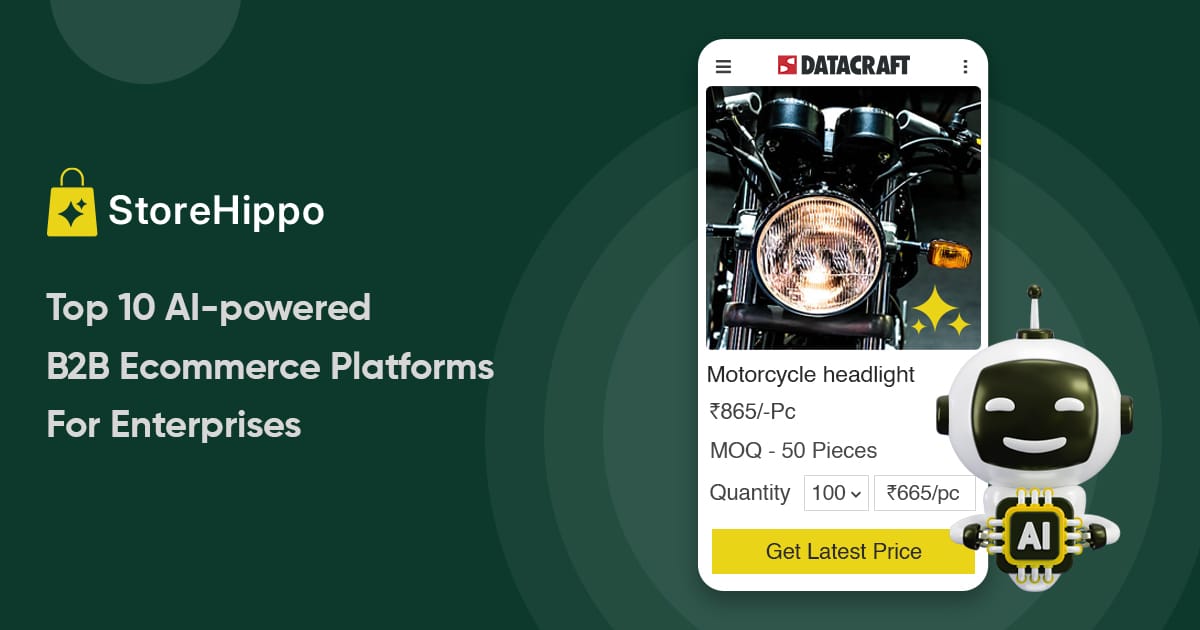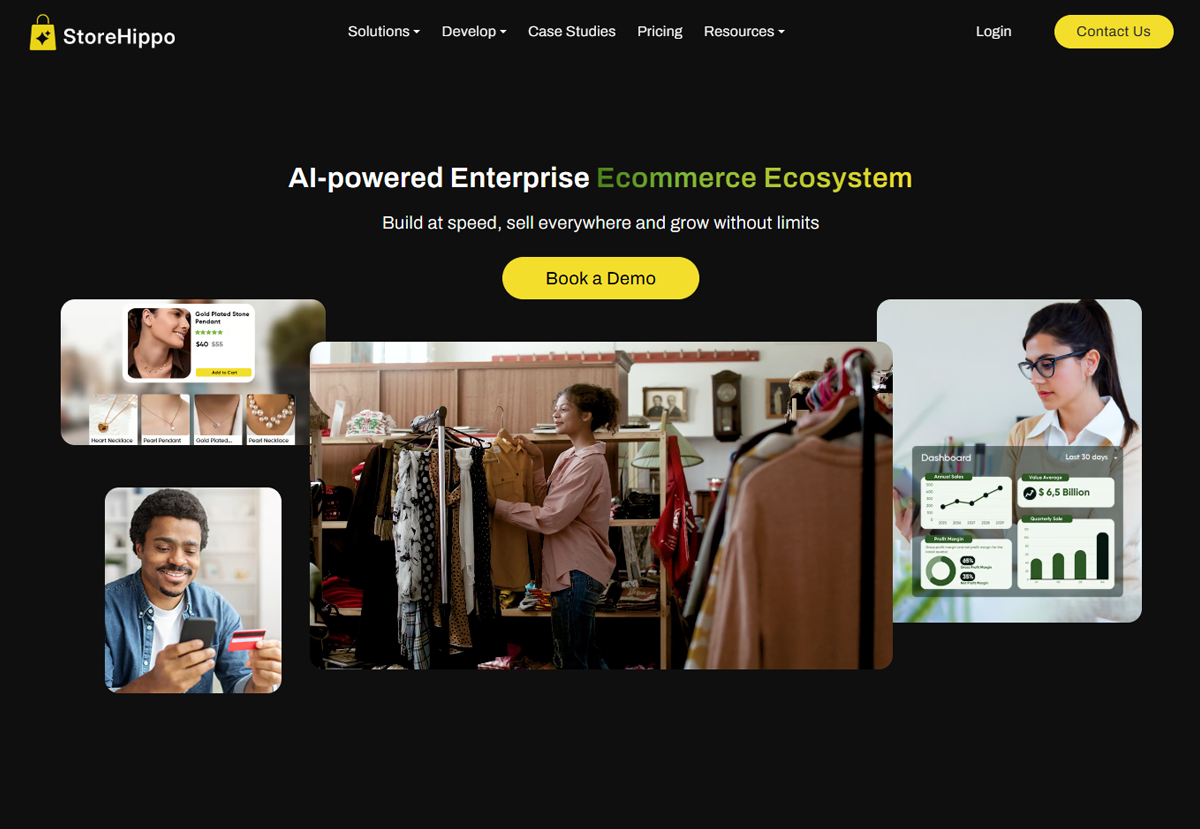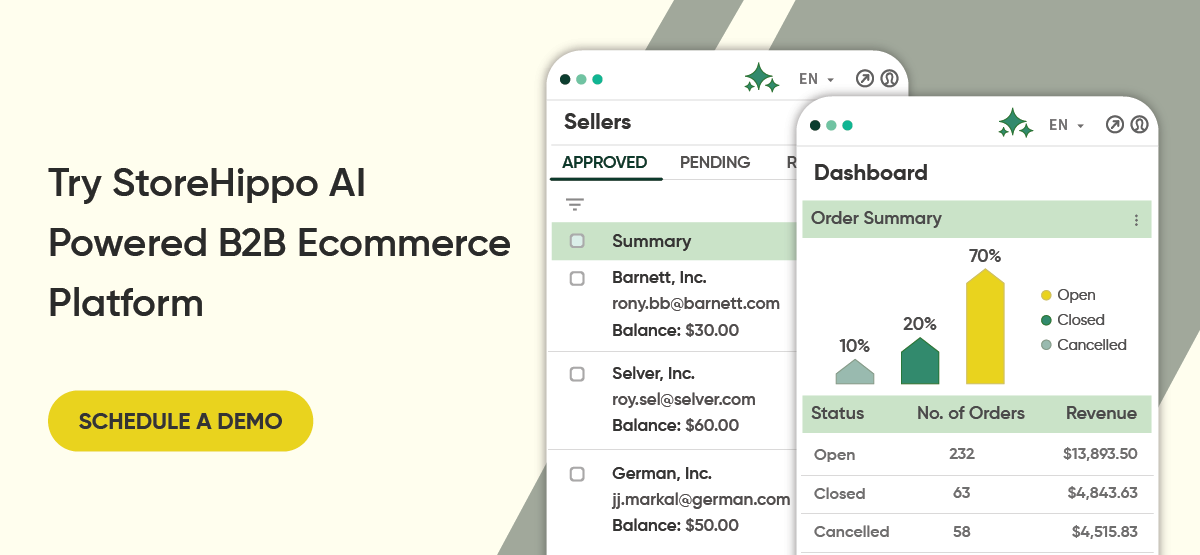If your B2B ecommerce platform still runs on manual uploads, static pricing, and market guesswork, your business is already a step behind. Today’s wholesale commerce needs more than automation; it needs intelligence.
Simply put, it’s time your brand considered an AI powered B2B ecommerce platform that goes beyond managing orders, one that learns from every transaction, predicts buyer intent, needs, and personalises every interaction.
Your business doesn’t just need operational efficiency, it needs an enterprise wholesale ecommerce platform that blends automation, analytics, and intelligence. A platform that helps you scale faster, serve smarter, and stay ahead in a market where data-driven decisions define growth and competitiveness.
AI isn’t just a fancy feature anymore, it's an advantage that can give your brand the winning edge. Let’s look at data-driven insights that highlight this further.
Table of Contents
- How AI-Powered B2B Ecommerce Platforms Benefit Enterprises
- What are the Immediate and Long-Term Benefits of Migrating to an AI-Powered B2B Ecommerce Platform?
- Top 10 AI-powered B2B Ecommerce Platforms For Enterprises
- 1. StoreHippo - Composable AI-Powered B2B Ecommerce Platform for Multi-Model Enterprises
- 2. Adobe Commerce (Magento) - Developer-Driven Enterprise Ecommerce Platform with Add-On AI Capabilities
- 3. BigCommerce (B2B Edition) - SaaS B2B Ecommerce Platform with App-Based AI
- 4. Shopify Plus - SaaS Enterprise Ecommerce Platform with Third-Party B2B and AI Integrations
- 5. Spryker Commerce OS - B2B Ecommerce Platform for Complex Enterprise Models
- 6. SAP Commerce Cloud - Enterprise B2B Ecommerce Platform with Integrated Business Workflows
- 7. Salesforce Commerce Cloud - SaaS B2B Ecommerce Platform with Native Einstein AI
- 8. OroCommerce - B2B-First Ecommerce Platform with Open-Source Flexibility
- 9. commercetools - Headless B2B Ecommerce Platform for Composable Architectures
- 10. HCL Commerce Cloud - Enterprise B2B Ecommerce Platform with Partner-Led AI
- A Comparison of 10 Best AI-Powered B2B Ecommerce Platforms for Enterprises in 2026
- Conclusion: Choosing the Right AI-Powered B2B Ecommerce Platform for Your Enterprise
- FAQ
How AI-Powered B2B Ecommerce Platforms Benefit Enterprises
The shift toward intelligence in B2B commerce is showing transformative progress.
Recent studies show that AI is directly improving business performance across the board:
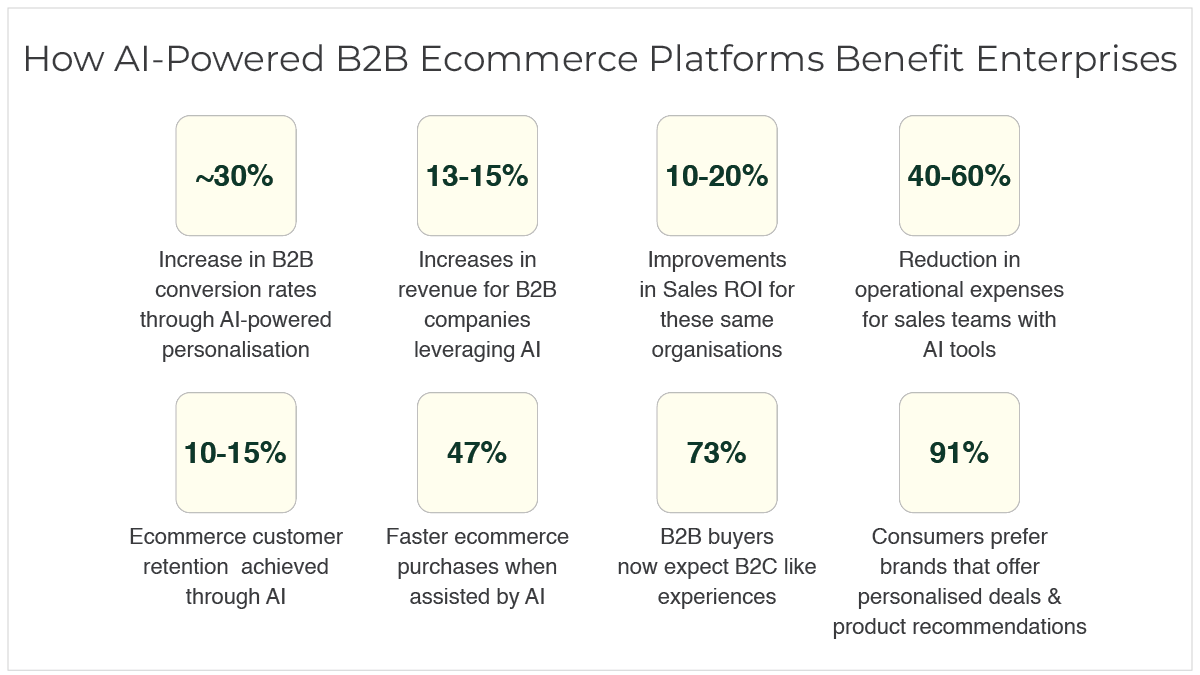
Why Does Your Enterprise Need AI-Powered B2B Ecommerce Platform
- ~ 30% increase in B2B conversion rates through AI-powered personalisation
- 13–15% increases in revenue for B2B companies leveraging AI
- 10–20% improvements in Sales ROI for these same organisations
- 40–60% reduction in operational expenses for sales teams with AI tools that automate communication
- 10% to 15% e-commerce customer retention achieved through AI
- 47% faster ecommerce purchases when assisted by AI
- 73% of B2B buyers now expect the same highly personalised, B2C like experiences
- 91% of consumers are more likely to shop with brands that provide personalised offers and recommendations
Source: McKinsey, SparxIT, Patent PCm, HelloRep
These numbers show why AI is becoming the backbone of modern wholesale and enterprise commerce. Traditional systems can process orders, but they can’t anticipate needs. An AI-powered B2B ecommerce platform brings decision-making, personalisation, and efficiency together, helping B2B brands turn complexity into competitive advantage. This is why choosing the right enterprise ecommerce platform with built-in AI capabilities is now central to sustainable, data-driven growth strategies.
What are the Immediate and Long-Term Benefits of Migrating to an AI-Powered B2B Ecommerce Platform?
Adopting an AI powered B2B ecommerce platform delivers both short-term gains and lasting business value. While the immediate benefits are seen in automation and efficiency, the long-term advantages reshape how enterprises grow, compete, and serve their customers.
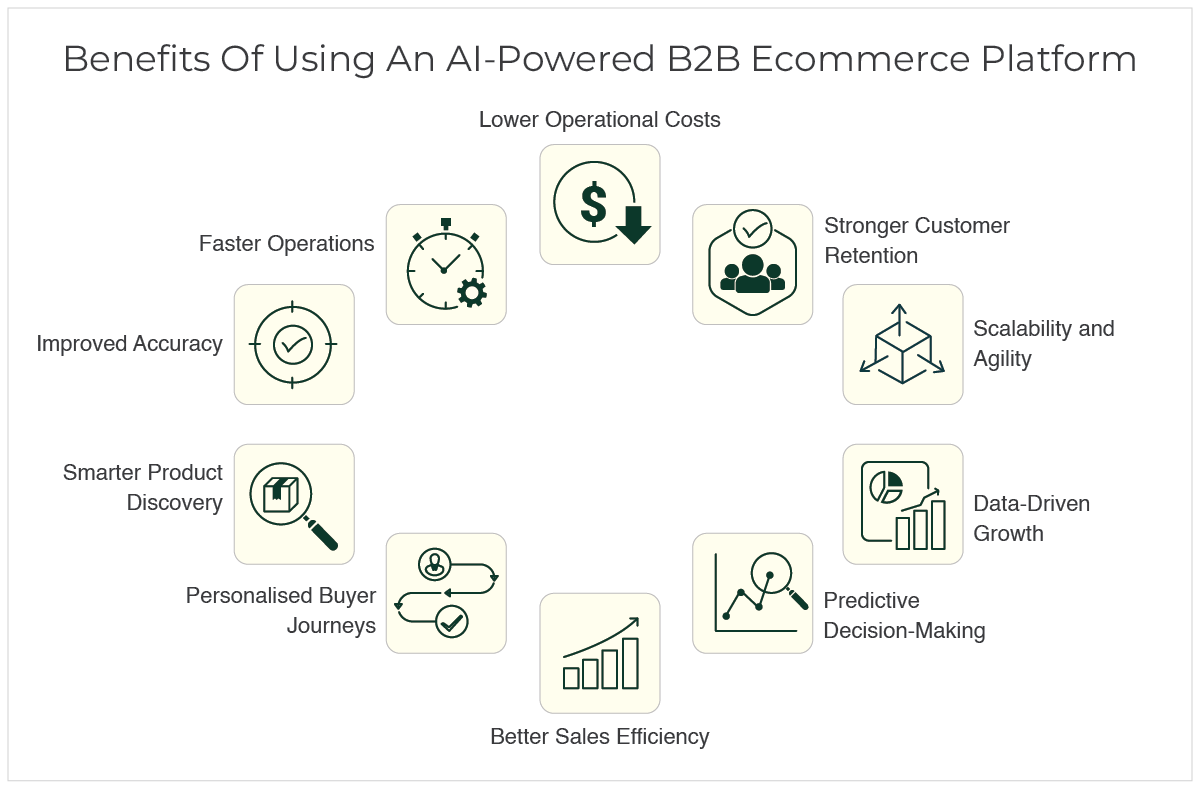
Immediate Benefits of Using An AI-Powered B2B Ecommerce Platform
Some immediate and most visible benefits of using AI for B2B ecommerce are:
- Faster Operations: AI automates repetitive B2B tasks, such as catalogue tagging and image enhancements, for more informed decisions, and bulk order approvals, reducing turnaround time from days to minutes.
- Improved Accuracy: Machine learning models minimise pricing and inventory errors, ensuring real-time data consistency across channels.
- Smarter Product Discovery: AI search and recommendation engines enable buyers to find the right products instantly, enhancing conversions.
- Personalised Buyer Journeys: Dynamic product suggestions, real-time offers, and contextual recommendations create a B2C-like experience for business buyers.
- Better Sales Efficiency: AI tools like Agentic Shopping assistants free sales teams from manual communication and offer self-serviced B2b buying on wholesale ecommerce platforms, enabling them to focus on key accounts and negotiations.
Long-Term Benefits Of Using An AI-Powered B2B Ecommerce Platform
Using AI in B2B ecommerce gives many indirect and long term benefits, like below:
- Predictive Decision-Making: AI continuously analyses buyer data to give insights for forecasting demand, optimising pricing, and personalising marketing at scale.
- Data-Driven Growth: Unified insights from sales, marketing, and customer interactions help identify new opportunities and improve ROI.
- Scalability and Agility: AI-enabled automation allows enterprises to expand into new markets or models (B2B2C, hybrid, hyperlocal) without reengineering the platform.
- Stronger Customer Retention: Consistent personalisation builds long-term loyalty and trust among repeat business buyers.
- Lower Operational Costs: Continuous process optimisation and predictive maintenance reduce manual workload and cost-to-serve over time.
Migrating to an AI-powered enterprise ecommerce platform gives businesses the dual advantage of efficiency and personalisation in the short term, which translates into strategic, intelligent decisions and business moves in the long run. It helps transform static operations into adaptive, agile ecosystems where every process learns, improves, and scales with your enterprise brand.
Now that you understand how AI enhances efficiency and drives growth, the next step is selecting the right foundation for your business.
Top 10 AI-powered B2B Ecommerce Platforms For Enterprises
Here’s a closer look at the 10 best AI-powered B2B ecommerce platforms that give enterprise decision-makers the insight, flexibility, and control to build intelligent, scalable digital commerce ecosystems.
1. StoreHippo - Composable AI-Powered B2B Ecommerce Platform for Multi-Model Enterprises
StoreHippo is a next-generation AI-powered B2B ecommerce platform designed for global and Indian enterprises managing complex, large-scale digital commerce ecosystems. With its pure headless, MACH-based architecture and built-in AI tools, StoreHippo enables enterprise wholesale brands to create agile, composable, and future-ready digital ecosystems that adapt to every business model - B2B marketplaces, B2C enterprise solutions, B2B+D2C storefronts for large brands, B2B2C solutions for wholesale and retail clients, multi-storefronts, or hybrid B2B models with hyperlocal play. It also provides built-in multilingual, multi-currency, tax engine and full GST support to run global as well as domestic B2B companies.
The platform’s no-plugin architecture, mobile-first framework, and enterprise-grade scalability make it a preferred choice for brands seeking flexibility and tailored bespoke B2B ecommerce solutions from their enterprise ecommerce platform. StoreHippo B2B ecommerce platform offers end-to-end solutions which includes gamut of built in marketing tools, payment solutions and pre-integrated logistics partners.
Key Highlights
- Core Architecture & Tech Stack: Pure headless, MACH architecture, MEAN stack; fully hosted and managed cloud environment ensuring performance and uptime.
- AI Capabilities: Built-in AI suite for cataloguing through product images, image editing with Magic Edit, semantic search, personalised recommendations, AI-powered voice commerce and AI support solutions for customers and vendors and option to make custom Agentic AI shopping assistants for business or industry niche, no third-party tools required.
- B2B Commerce Features: Native B2B ecommerce solutions like tiered pricing, MOQ, quote requests (RFQ), bulk ordering, credit limits, centralised master catalogue, customer or region-specific catalogues, and role-based access for distributors and resellers.
- Customisation And Extensibility: Low-code platform, drag and drop tools for design, extensible entities with advanced APIs and hooks for complex workflows; supports custom integrations and enterprise-level personalisation.
- Integrations: Pre-integrated with 60+ payment gateways, 30+ logistics providers, marketing, accounting and other tools, seamless interactions with DMS, ERP, CRM, POS, warehouses and more; no dependence on extensions.
- Mobile Readiness: Built-in mobile app builder for Android/iOS, progressive web apps, and built-in backend apps for admin, vendors and delivery boys.
- Omnichannel Support: Easily add new frontends like webstore, PWA site, mobile apps, WhatsApp Business Account, custom AI chatbot shopping interface etc to sell omnichannel.
- Performance And Scalability: Auto-scaling cloud infrastructure optimised for high-volume transactions and peak-load performance.
- Security And Compliance: PCI-DSS certified, SOC, encryption, SSO, and audit control and more.
- Agility And Maintenance Efficiency: Versionless auto-updates, zero downtime deployment, and the fastest go-to-market setup in its class.
Pros
- Native B2B and wholesale ecommerce platform features, no extensions/plugins required.
- Built-in support for distributor-based B2B marketplaces and B2B wholesale apps.
- Pure headless and AI-powered enterprise ecommerce platform with multi-model flexibility.
- Mobile-first with built-in mobile apps builder, vendor, and admin apps.
- Full support for international B2B business with built-in go global solutions, multilingual, multi-currency and multi-store network managed by a common admin for various geographies.
- 150+ pre-integrations for payment gateways, logistics, marketing and more.
- Fast GTM, auto-updates and low total cost of ownership.
Cons
- Advanced enterprise modules are available only in higher-tier plans.
- Teams moving from plugin-based systems may require adapting to headless built-in workflows.
Pricing
Enterprise Plan – from $499/month
Platinum Plan – Custom pricing for large enterprises
Best For
Enterprises and B2B brands seeking a wholesale ecommerce platform with built-in AI, global scalability, and the agility to support multi-store, multi-vendor, and multi-model operations - all without relying on third-party plugins.
2. Adobe Commerce (Magento) - Developer-Driven Enterprise Ecommerce Platform with Add-On AI Capabilities

Adobe Commerce, formerly Magento, is an open-source enterprise ecommerce platform that enables large businesses to build customised digital commerce systems. It supports B2B and B2C ecommerce through configurable modules and a wide ecosystem of third-party extensions. While it provides flexibility in development, many enterprise and AI-powered capabilities depend on external plugins or partners, resulting in longer setup and higher maintenance requirements compared to modern AI powered B2B ecommerce platforms.
Key Highlights
- Core Architecture & Tech Stack: PHP-based modular framework using MySQL and Elasticsearch. Available in two editions- Magento Open Source (self-hosted) and Adobe Commerce (enterprise cloud).
- AI Capabilities: Integrates with Adobe Sensei for AI-driven personalisation, search optimisation, and recommendations. Broader AI use cases, such as image-based cataloguing or conversational AI, require additional integrations like Algolia or Klevu.
- B2B Commerce Features: Includes modules for company accounts, tiered pricing, RFQ (Request for Quote), purchase approvals, and shared catalogues. Suitable for structured B2B operations but needs configuration or development to align with complex enterprise workflows.
- Customisation And Extensibility: Fully open-source B2B ecommerce platform; supports extensive code-level customisation and API-led development. Maintenance, upgrades, and compatibility testing remain ongoing responsibilities for enterprise teams.
- Integrations: Works with ERP, CRM, and analytics systems through APIs or marketplace extensions. Advanced ecommerce, logistics, and AI integrations are largely third-party dependent.
- Mobile Readiness: Includes responsive storefronts and PWA Studio; no native mobile app builder, third party development needed for B2B mobile apps, vendor and admin mobile apps are available via external developers.
- Omnichannel Support: Connects with Adobe Experience Cloud for marketing automation; requires add-ons for POS, WhatsApp commerce, or chat interfaces.
- Performance And Scalability: Scales effectively with cloud infrastructure but may need optimisation for large catalogues and heavy traffic loads.
- Security And Compliance: PCI-ready and regularly patched; relies on technical teams for vulnerability management.
- Agility And Maintenance Efficiency: Frequent version updates and reliance on extensions increase development cycles and operational overhead.
Pros
- Open-source framework allows complete ownership and customisation.
- Built-in modules for B2B operations like quotes and tiered pricing.
- Strong multilingual and multi-currency configuration.
- Broad ecosystem for third-party extensions and services.
Cons
- Most advanced and AI-driven capabilities require paid extensions.
- High implementation and maintenance effort.
- Limited native mobile and omnichannel tools.
Pricing
Magento Open Source – Free (self-managed).
Adobe Commerce Cloud – Starts at approximately $22,000/year, plus costs for hosting, development, and third-party modules.
Best For
Enterprises seeking a developer-controlled B2B ecommerce platform that allows extensive backend customisation and integration flexibility, and that have internal technical resources to manage deployment and updates.
3. BigCommerce (B2B Edition) - SaaS B2B Ecommerce Platform with App-Based AI

BigCommerce (B2B Edition) is a cloud-hosted B2B ecommerce platform designed for enterprises that prefer SaaS convenience with built-in business buyer features. It combines core B2B workflows with a flexible app marketplace, making it suitable for wholesale ecommerce platform setups, global brands, and hybrid B2B + B2C models. While it supports AI through integrations, most advanced capabilities are powered by third-party apps, not built natively into the platform.
Key Highlights
- Core Architecture And Tech Stack: Multi-tenant SaaS built on Stencil framework, API-first with native multi-storefront support from one backend.
- AI Capabilities: Basic AI features for product recommendations and analytics; advanced tools for personalisation, search, and merchandising available via partner apps like Algolia, Klevu, or Bloomreach.
- B2B Commerce Features: Includes company accounts, buyer roles, quote management (RFQ), shared catalogues, tiered pricing, purchase order workflows, and quick order pads designed for wholesale transactions.
- Customisation And Extensibility: Low-code design customisation through the theme editor; open APIs and SDKs enable deeper custom workflows or integrations.
- Integrations And Ecosystem: Large marketplace of prebuilt connectors for ERP, CRM, payments, logistics, and marketing tools commonly used in enterprise ecommerce platforms.
- Mobile Readiness: Offers responsive storefronts and PWA support for mobile access. No native mobile app builder; buyer and admin apps can be built using APIs or via third-party developers.
- Omnichannel Support: Connects with leading marketplaces and social platforms; inventory and order data can be synced across channels using partner integrations.
- Performance And Scalability: SaaS architecture ensures uptime and scalability with automatic updates and CDN support.
- Security and Compliance: PCI DSS Level 1 certified; SSO and advanced access control available via extensions.
- Agility And Maintenance Efficiency: Fast implementation and automatic updates, though reliance on external apps can increase operational costs over time.
Pros
- Ready-to-use B2B ecommerce platform features with SaaS simplicity.
- Large app ecosystem for extending AI, logistics, and marketing workflows.
- Multi-storefront support for cross-border or multi-brand operations.
- Fast deployment and lower technical overhead.
Cons
- AI tools and advanced B2B automation rely on third-party integrations.
- No native mobile app builder; external development needed for apps.
- App dependency can lead to higher long-term costs and maintenance.
Pricing
Custom enterprise pricing based on usage and GMV.
Lower-tier plans (Plus/Pro) are available but lack full B2B Edition features.
Best For
Enterprises and wholesalers looking for a scalable SaaS-based B2B ecommerce platform with essential B2B tools built in and the flexibility to enhance AI and omnichannel capabilities through partner integrations.
4. Shopify Plus - SaaS Enterprise Ecommerce Platform with Third-Party B2B and AI Integrations

Shopify Plus is a cloud-based enterprise ecommerce platform built to handle large online stores. It can also work as a B2B ecommerce platform by adding wholesale tools and partner apps that enable business-to-business selling. The platform offers strong reliability and quick deployment, but most advanced AI powered B2B ecommerce platform capabilities depend on integrations and plugins. The platform is used by retail and wholesale enterprises that focus on speed and usability instead of building highly customised systems
Key Highlights
- Core Architecture And Tech Stack: Fully hosted SaaS built on Ruby on Rails with Liquid templating; API-first and cloud-native.
- AI Capabilities: Includes Shopify AI for basic personalisation and marketing insights. Broader AI use cases, such as product search, recommendations, or automated cataloguing, require third-party tools like Klevu or Rebuy.
- B2B Commerce Features: Offers company profiles, volume-based pricing, purchase orders, catalogues for business customers, and custom payment terms under the B2B for Shopify Plus program. Advanced wholesale workflows often need marketplace apps such as Webkul or B2B King.
- Customisation And Extensibility: Low-code customisation through Liquid templates and APIs; limited backend flexibility compared to open-source enterprise ecommerce platforms.
- Integrations And Ecosystem: Extensive app store and integrations covering payments, shipping, ERP, CRM, and marketing automation. Most B2B and AI capabilities are app-based.
- Mobile Readiness: Responsive storefronts and PWA support available. Shopify Plus does not include a native mobile app builder; buyer and admin apps can be built or purchased via third-party developers.
- Omnichannel Support: Connects webstore, POS, and social channels under one dashboard; WhatsApp or conversational commerce integrations require apps.
- Performance And Scalability: Auto-scaling SaaS with high uptime; performance tuning managed by Shopify infrastructure.
- Security And Compliance: PCI DSS compliant, SSL included, and enterprise-grade hosting security.
- Agility And Maintenance Efficiency: Versionless SaaS updates and quick go-live timelines; reliance on apps increases long-term management complexity.
Pros
- Quick setup and SaaS simplicity for B2B and B2C brands.
- Vast ecosystem of apps and partners for extending AI and wholesale features.
- Integrated POS and social selling tools for omnichannel selling.
- Reliable infrastructure with automatic scaling and updates.
Cons
- Most B2B and AI functions depend on external apps.
- Limited backend customisation for complex B2B workflows.
- No native mobile app builder; external apps or developers required.
Pricing
Starts at $2,000/month for Shopify Plus.
Additional marketplace and AI integrations carry extra monthly or licensing fees.
Best For
Enterprises seeking a SaaS wholesale ecommerce platform that offers quick setup, global scalability, and essential B2B features through integrations, ideal for brands prioritising speed and operational simplicity over deep native customisation.
5. Spryker Commerce OS - B2B Ecommerce Platform for Complex Enterprise Models
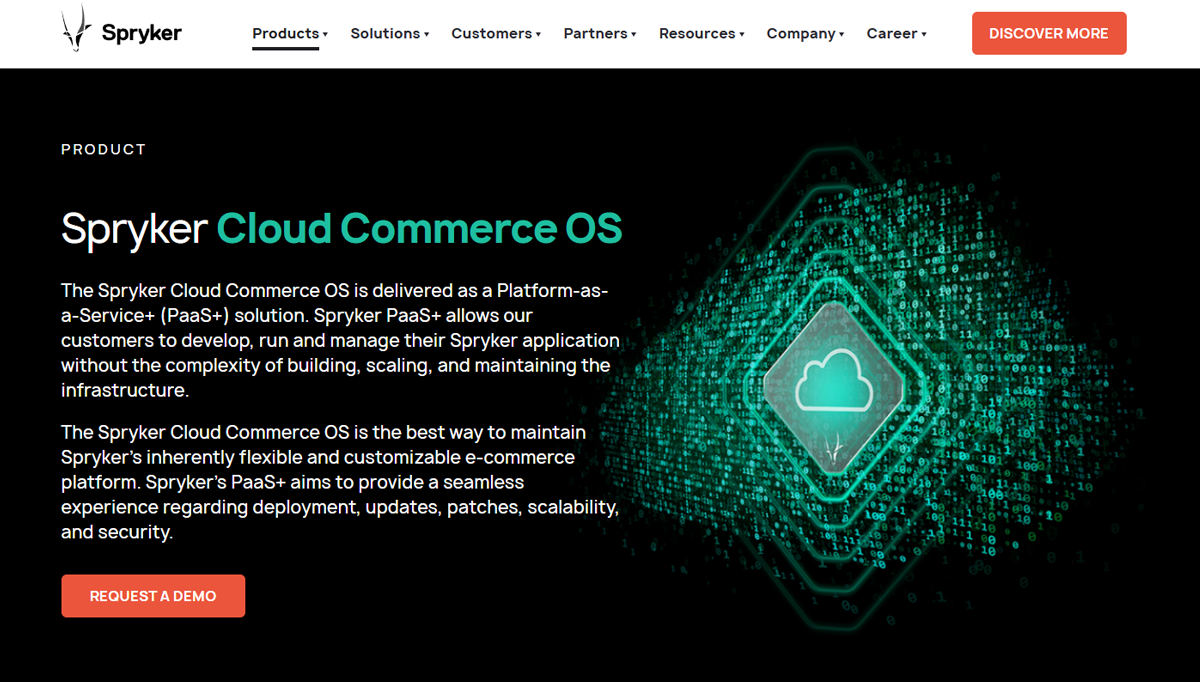
Spryker Commerce OS is a modular enterprise ecommerce platform built on a composable architecture. It is designed for large organisations that need flexible B2B, B2C, or marketplace solutions. As an AI-powered B2B ecommerce platform, Spryker offers composable integrations for personalisation, search, and automation through its partner ecosystem. Most AI and wholesale workflows are achieved by connecting specialised extensions and not with built-in tools.
Key Highlights
- Core Architecture And Tech Stack: API-first, PHP/Symfony-based composable setup with Packaged Business Capabilities (PBCs).
- AI Capabilities: No native AI suite; integrates partner tools for AI-driven recommendations, personalisation, and semantic search.
- B2B Commerce Features: Supports company accounts, bulk order management, approval chains, RFQs, price negotiation, custom catalogues, and buyer roles configurable via modules.
- Customisation And Extensibility: Highly flexible through modular PBCs and APIs; enterprises can develop or replace individual commerce components.
- Integrations & Ecosystem: Works with ERP, CRM, PIM, and logistics systems through connectors and partner applications.
- Mobile Readiness: Responsive storefronts and PWA support included in the enterprise ecomemrce platform; no native mobile app builder. Buyer or admin apps can be built via APIs or external developers.
- Omnichannel Support: Allows integration of multiple frontends web, mobile, or third-party marketplaces, connected to a unified backend.
- Performance And Scalability: Scalable microservices-based deployment suitable for multi-region or high-volume operations.
- Security And Compliance: Enterprise-level controls with SSO, access roles, and compliance with data security standards.
- Agility And Maintenance Efficiency: Version-controlled updates; requires in-house or partner teams for ongoing customization and maintenance.
Pros
- Modular, composable design suited for complex enterprise models.
- Strong B2B workflows and multi-frontend flexibility.
- Broad partner network for AI, analytics, and integrations.
- Scalable architecture supporting global operations.
Cons
- No native AI tools; partner integration required.
- Requires skilled developers or SI partners for setup and scaling the wholesale ecommerce platform.
- No built-in mobile app builder; external development needed.
Pricing
Custom enterprise pricing based on selected modules and transaction volumes.
Best For
Large enterprises and technology-driven organisations seeking a composable B2B ecommerce platform with advanced customisation options and the ability to add AI-powered and wholesale features through modular integrations.
6. SAP Commerce Cloud - Enterprise B2B Ecommerce Platform with Integrated Business Workflows
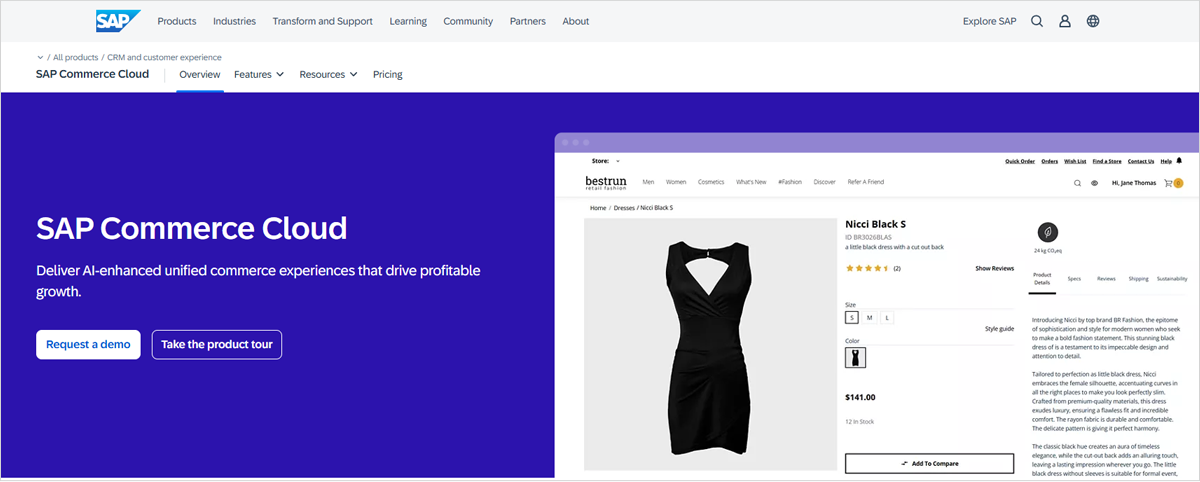
SAP Commerce Cloud is an enterprise ecommerce platform designed for large organisations managing complex B2B and B2C operations. Built on SAP’s cloud ecosystem, it helps enterprises create connected buying experiences across multiple business models and regions. It offers AI-driven recommendations and personalisation in its B2B ecommerce platform through SAP AI services, but advanced features often rely on the broader SAP suite rather than the commerce layer alone.
Key Highlights
- Core Architecture And Tech Stack: Java-based, modular architecture; integrates deeply with other SAP products such as ERP, CRM, and S/4HANA.
- AI Capabilities: Uses SAP AI and SAP Customer Data Cloud for product recommendations, behavioural insights, and personalisation. Broader AI capabilities are available through add-ons within the SAP ecosystem.
- B2B Commerce Features: Includes organisation hierarchies, buyer roles, custom pricing, contract management, RFQ, and approval workflows designed for enterprise procurement.
- Customisation And Extensibility: Flexible but developer-led; customisation typically requires SAP Commerce developers or implementation partners.
- Integrations & Ecosystem: The enterprise ecommerce platform natively connects with SAP ERP, SAP CRM, and supply chain solutions. Integration with non-SAP systems is possible through APIs, but often needs middleware.
- Mobile Readiness: Responsive storefronts and PWA support provided; no built-in mobile app builder. Enterprises can create mobile apps using SAP SDKs or third-party developers.
- Omnichannel Support: Unifies data across online, in-store, and partner channels using SAP’s central product and customer databases.
- Performance And Scalability: Enterprise-grade performance with auto-scaling on Azure; optimised for high transaction volumes.
- Security And Compliance: Enterprise-level security with GDPR, SSO, role-based access, and regional compliance options.
- Agility And Maintenance Efficiency: Frequent version updates and dependency on SAP ecosystem can increase implementation time and maintenance costs.
Pros
- Deep integration with SAP ERP and supply chain systems.
- B2B modules for contracts, pricing, and corporate accounts.
- Reliable scalability for large, global operations on the B2B ecommerce platform.
- Strong data governance and compliance support.
Cons
- High setup and maintenance costs due to dependency on SAP ecosystem for building the wholesale e-commerce platform.
- Not a native AI-powered B2B ecommerce platform as AI features are mainly available as add-ons or external SAP modules.
- No native mobile app builder; external development required.
Pricing
Enterprise pricing based on usage, integrations, and the number of modules. Typically licensed as part of the SAP suite.
Best For
Enterprises already using SAP’s ERP or CRM solutions that need a B2B ecommerce platform tightly connected to backend business systems, and are ready to extend AI and omnichannel capabilities through the SAP ecosystem.
7. Salesforce Commerce Cloud - SaaS B2B Ecommerce Platform with Native Einstein AI
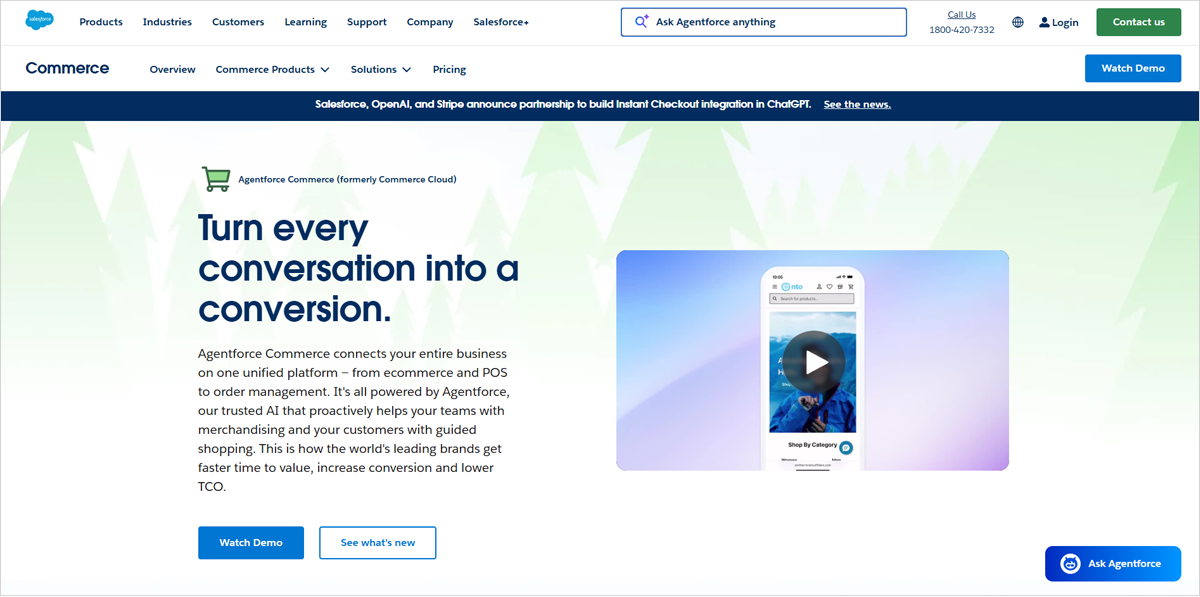
Salesforce Commerce Cloud is a SaaS enterprise ecommerce platform that connects storefronts with Salesforce’s CRM, Service, and Marketing products. It supports B2C and B2B use cases and can serve as an AI powered B2B ecommerce platform through Einstein for search, recommendations, and personalisation. Many wholesale workflows are available in the B2B product, with further automation possible via other Salesforce clouds.
Key Highlights
- Core Architecture And Tech Stack: Multi-tenant SaaS with API-first services; tight alignment with the broader Salesforce platform.
- AI Capabilities: Einstein provides native AI for product discovery, recommendations, and personalisation. Additional AI automation can be added using Salesforce Data Cloud and Marketing Cloud.
- B2B Commerce Features: Supports company accounts, negotiated price lists, quotes, approval workflows, quick order, reorder, and account-based catalogues.
- Customisation And Extensibility: Low-code options via flows and builders; deeper customisation through APIs and Apex on the Salesforce platform.
- Integrations And Ecosystem: Native connectors to Salesforce CRM/Service/CPQ; integrations to ERP and logistics via AppExchange or middleware.
- Mobile Readiness: Responsive storefronts and PWA support; no native mobile app builder for building wholesale ecommerce apps. Buyer/admin apps can be created on the Salesforce platform or by third-party developers.
- Omnichannel Support: Unifies data across web, service, and sales channels; store or marketplace connections typically use partner integrations.
- Performance And Scalability: Auto-scaling SaaS with global CDN and SLAs for large catalogues and traffic.
- Security And Compliance: Enterprise security, SSO, audit trails, and compliance features aligned with the Salesforce trust model.
- Agility And Maintenance Efficiency: Versionless updates; dependency on multiple Salesforce clouds can increase license and integration management.
Pros
- Native AI (Einstein) for search and personalisation.
- Built-in B2B ecommerce platform features for quotes, approvals, and account catalogues.
- Strong data and workflow alignment with Salesforce CRM and Service.
- SaaS reliability with automatic scaling and updates.
Cons
- Broader functionality often requires additional Salesforce products for large B2B ecommerce platforms.
- No native mobile app builder; custom apps require platform development.
- Licensing across multiple clouds can raise TCO.
Pricing
Enterprise pricing varies by product mix (B2B, Data Cloud, Marketing, Service). Typically licensed per org and usage, with add-ons for AI and integrations.
Best For
Organisations standardising on Salesforce that need an enterprise ecommerce platform with native AI and B2B workflows, and that plan to extend wholesale operations using the wider Salesforce ecosystem.
8. OroCommerce - B2B-First Ecommerce Platform with Open-Source Flexibility

OroCommerce is an open-source B2B ecommerce platform built on Symfony. It is designed around business buying workflows and can support B2C or marketplace models with extensions. AI features are available through partner tools, which let teams assemble an AI powered B2B ecommerce platform for pricing, search, and merchandising. It suits wholesale and distribution use cases that need account structures, RFQs, and negotiated terms on an enterprise ecommerce platform.
Key Highlights
- Core Architecture And Tech Stack: PHP/Symfony framework with community and enterprise editions; API-first.
- AI Capabilities: No native AI suite; integrates with third-party services for recommendations, semantic search, and personalisation.
- B2B Commerce Features: Company accounts, buyer roles, RFQ/quote management, negotiated pricing, custom catalogues, approval flows, order templates, and punchout (via add-ons).
- Customisation And Extensibility: Open-source codebase with modular bundles; supports custom workflows and integrations via REST APIs on B2B ecommerce platforms.
- Integrations And Ecosystem: Connectors and integrations for ERP, CRM (OroCRM native), PIM, payments, and logistics; marketplace add-ons available.
- Mobile Readiness: Responsive storefronts and PWA support; no native mobile app builder. Buyer/admin/vendor apps can be developed using APIs or obtained from third parties.
- Omnichannel Support: Supports multiple catalogues and storefronts; external channels (marketplaces, sales portals) connect through integrations.
- Performance And Scalability: Scales with proper infrastructure sizing; caching and search tuning recommended for large catalogues.
- Security And Compliance: Role-based access, SSO options, audit logs; compliance depends on enterprise deployment practices.
- Agility And Maintenance Efficiency: Open-source control with regular releases; requires in-house or partner teams for upgrades and module management.
Pros
- B2B ecomemrce platform with strong quoting and account management.
- Open-source flexibility for custom workflows in wholesale ecommerce.
- Built-in CRM (OroCRM) alignment for account and sales data.
- Supports multi-store and multi-catalogue structures.
Cons
- No native AI; relies on partner tools for advanced discovery and personalisation.
- Implementation and maintenance require developer resources.
- No native mobile app builder.
Pricing
Community edition is free. Enterprise edition is licensed (custom pricing). Additional costs for hosting, support, and paid extensions.
Best For
Distributors, manufacturers, and wholesalers that need a B2B ecommerce platform with strong RFQ and negotiated pricing flows, open-source control, and the option to compose AI-powered features through integrations.
9. commercetools - Headless B2B Ecommerce Platform for Composable Architectures
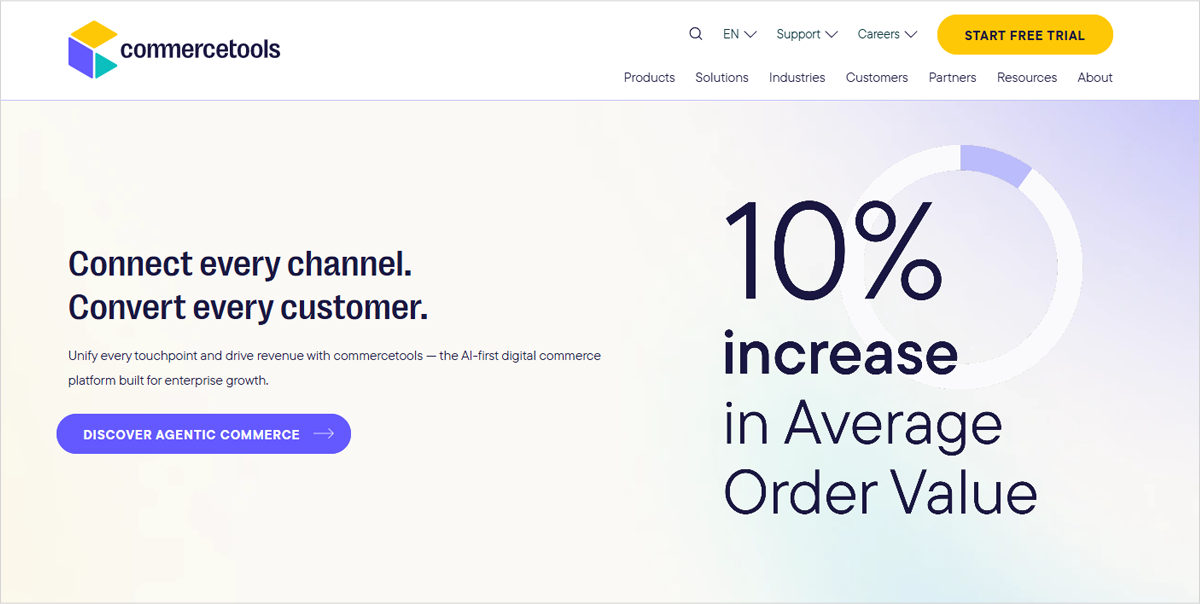
commercetools is a headless enterprise ecommerce platform built around APIs and microservices. It is suited to teams that want to assemble a B2B ecommerce platform from best-of-breed services. AI features like search, recommendations, and merchandising are added via partner tools, allowing enterprises to compose an AI-powered B2B ecommerce platform for wholesale and multi-brand use cases.
Key Highlights
- Core Architecture And Tech Stack: Cloud-native, API-first, microservices with GraphQL; fully headless and MACH-aligned.
- AI Capabilities: No native AI suite; integrates partner tools (e.g., search, recs, personalisation) to build an AI-powered wholesale ecommerce platform for enterprises.
- B2B Commerce Features: Supports company accounts, custom price lists, contract pricing, approval flows, RFQs, buyer roles, and account catalogues via B2B components and integrations.
- Customisation And Extensibility: High flexibility through APIs, events, and functions; frontends are custom-built or implemented with partner accelerators.
- Integrations And Ecosystem: Broad partner network for ERP, PIM, CRM, OMS, payments, logistics, and data platforms.
- Mobile Readiness: Headless enables responsive/PWA frontends; no native mobile app builder. Mobile apps are built with SDKs/APIs or via third parties.
- Omnichannel Support: One commerce backend powering multiple frontends, web, apps, kiosks, and marketplaces with unified products and orders.
- Performance And Scalability: Elastic, regionally deployed infrastructure designed for large catalogues and high traffic on wholesale ecommerce platforms .
- Security And Compliance: Enterprise security, role-based access, SSO/SAML support; compliance aligned with major standards.
- Agility And Maintenance Efficiency: Frequent, managed releases; assembly effort shifts to solution integrators and in-house teams.
Pros
- Composable, headless model for tailored B2B and wholesale ecommerce.
- Strong partner ecosystem for AI, search, and data services.
- Scales well across multi-brand and multi-region setups.
- Clear API contracts for faster integration work.
Cons
- No native AI or mobile app builder.
- Requires solution integrators and frontend development.
- TCO depends on number of partner services adopted.
Pricing
Usage-based enterprise licensing; costs vary by traffic, data, and feature mix. Partner tools and SI efforts are additional.
Best For
Enterprises standardising on a composable B2B ecommerce platform that prefer to assemble AI-powered capabilities to create an AI powered B2B ecommerce platform and frontends from partner services, with control over architecture and scaling strategy.
10. HCL Commerce Cloud - Enterprise B2B Ecommerce Platform with Partner-Led AI

HCL Commerce Cloud is an enterprise ecommerce platform evolved from IBM WebSphere Commerce. It focuses on large, complex B2B and B2C programs with strong catalogue, pricing, and contract controls. Teams can put together an AI-powered B2B ecommerce platform by integrating partner tools for search, recommendations, and analytics, making it suitable for wholesale ecommerce platform use cases that require strict governance and scale.
Key Highlights
- Core Architecture And Tech Stack: Java-based platform with microservices, Kubernetes deployment options, and API-first services.
- AI Capabilities: No native end-to-end AI suite; plugs into partner solutions for recommendations, semantic search, merchandising, and insights.
- B2B Commerce Features: Organisation hierarchies, entitlement-based catalogues, contract pricing, RFQ, approval workflows, purchase lists, re-order, and account-specific promotions.
- Customisation And Extensibility: Extension points, REST APIs, and eventing support custom workflows and integrations; developer-led implementations are typical.
- Integrations And Ecosystem: Connectors and middleware patterns for ERP, PIM, CRM, OMS, payments, and logistics; strong legacy enterprise compatibility.
- Mobile Readiness: Responsive storefronts and PWA options; no native mobile app builder. Buyer/admin apps require custom development or third-party builders via APIs.
- Omnichannel Enablement: Centralised product and pricing rules can feed multiple frontends; store, marketplace, or sales portals connect through integrations.
- Performance And Scalability: Proven at high volume with horizontal scaling and CDN; designed for large catalogues and multi-region rollouts.
- Security And Compliance: Enterprise controls, SSO/SAML, audit trails, and compliance features suitable for regulated industries.
- Agility And Maintenance Efficiency: Release management and upgrades require planned cycles; implementation usually involves SI partners.
Pros
- Mature B2B ecommerce platform capabilities for contracts, pricing, and entitlements.
- Scales for global, multi-brand programs with governance.
- Flexible integration patterns for complex enterprise stacks.
Cons
- No native mobile app builder; apps need custom or third-party development.
- AI and advanced discovery rely on partner tools.
- Longer implementation timelines for building an enterprise B2B ecommerce platform and higher service involvement.
Pricing
Enterprise licensing is based on usage, environments, and modules; services and partner tools are additional.
Best For
Large enterprises need a wholesale ecommerce platform with strict B2B controls, predictable scaling, and the ability to compose AI-powered capabilities on the B2B ecommerce platform through partner integrations and custom development.
A Comparison of 10 Best AI-Powered B2B Ecommerce Platforms for Enterprises in 2026
Here is a quick comparison table for enterprise decision makers listing the features of the best AI-powered B2B ecommerce solution providers:
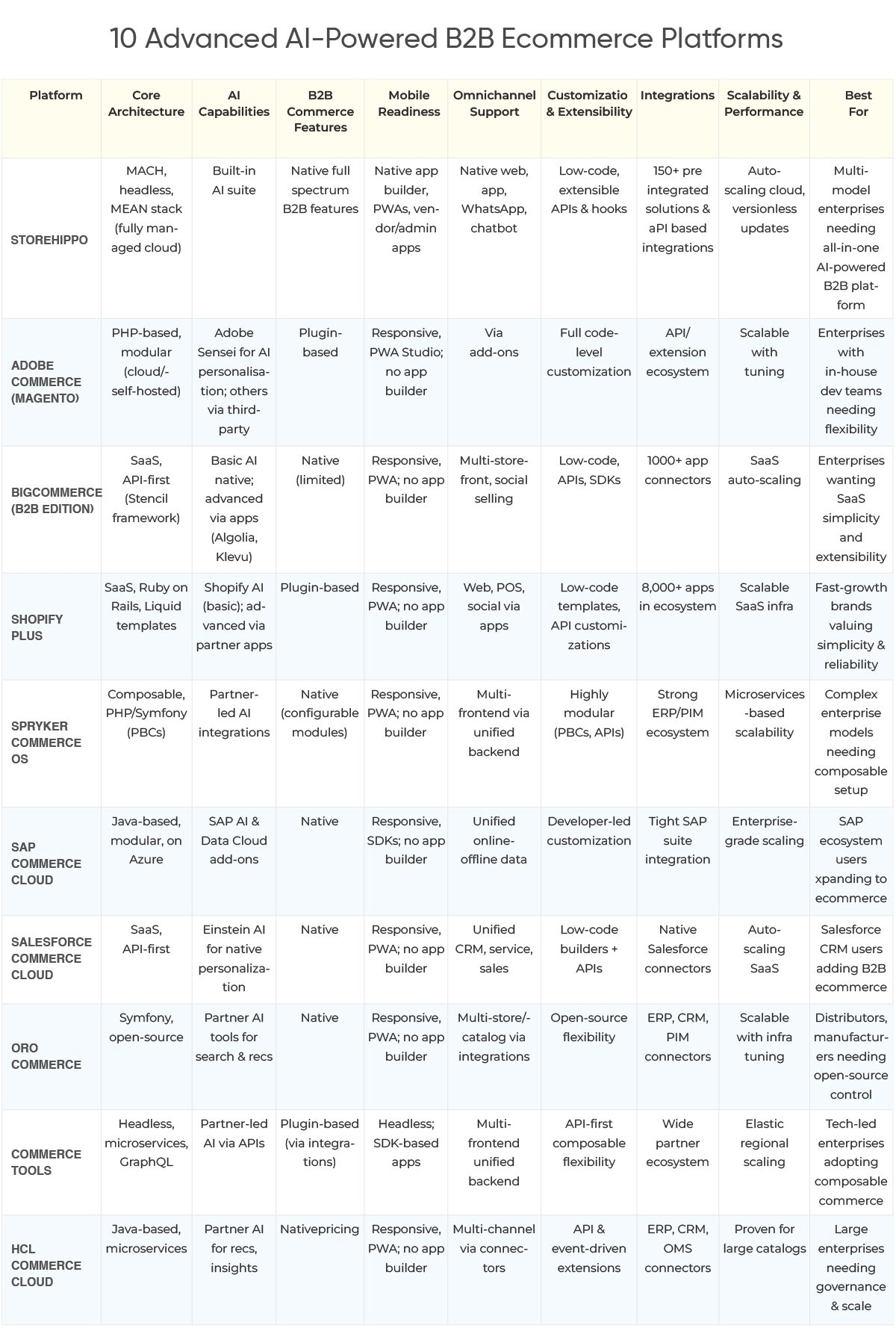
Conclusion: Choosing the Right AI-Powered B2B Ecommerce Platform for Your Enterprise
AI enables enterprises to work smarter by turning data into actionable insights. An AI-powered B2B ecommerce platform helps businesses anticipate market shifts, make faster decisions, and adapt strategies in real time, creating a more agile and connected way to operate in competitive B2B markets.
Whether your brand focuses on wholesale, manufacturing, distribution, or multi-store commerce, AI simplifies complex workflows and brings the speed and intelligence modern B2B buyers expect. To achieve that, your business needs the best B2B ecommerce platform with built-in AI capabilities designed for enterprise-scale commerce.
Each of the ten platforms discussed above supports these goals differently. The right choice depends on your priorities, speed to market, scalability, flexibility, or native AI depth.
If you’re ready to modernise your enterprise operations, start with StoreHippo, a fully integrated, AI-powered B2B ecommerce platform built for flexibility, speed, and intelligent growth.
Experience how StoreHippo AI solutions for B2B ecommerce can transform your business. Book your demo today.
FAQ
1. What makes an AI-powered B2B ecommerce platform different from a traditional one?
An AI-powered B2B ecommerce platform uses built-in intelligence to automate workflows, personalise buyer journeys, and learn from customer interactions to help decision makers make strategic growth decisions, something traditional platforms can’t do without multiple integrations.
2. How do AI capabilities improve ROI in B2B ecommerce platforms?
AI delivers ROI on two levels, immediate and long-term. In the short term, it streamlines repetitive workflows and reduces operational costs. Over time, it compounds value by uncovering buyer patterns, predicting demand, and enabling smarter business decisions. For most B2B ecommerce platforms, this means consistent efficiency gains, higher order value, and sustainable growth driven by data, not intuition.
3. Is it better to choose a native AI solution or a plugin-based AI integration for wholesale ecommerce platform?
Native AI in an enterprise ecommerce platform ensures smoother performance, consistent updates, and unified analytics. Plugin-based AI may increase cost, maintenance, and data fragmentation.
4. Are AI-powered B2B ecommerce platforms scalable across multiple stores, brands, or geographies?
Modern enterprise ecommerce platforms like StoreHippo support AI features and scalability, enabling multi-store, multilingual, and multi-currency operations from a unified backend with minimal manual intervention.
5. What factors should enterprises prioritize when selecting an AI-powered B2B ecommerce platform?
Decision-makers should evaluate the AI depth, B2B-native features, customisation scope, integration ease, and scalability of each platform before choosing one that aligns with their growth goals.
